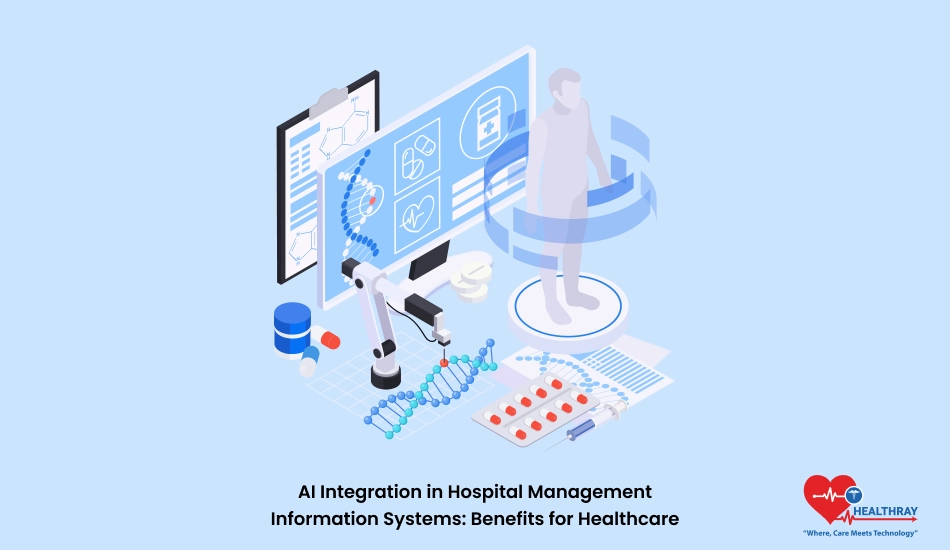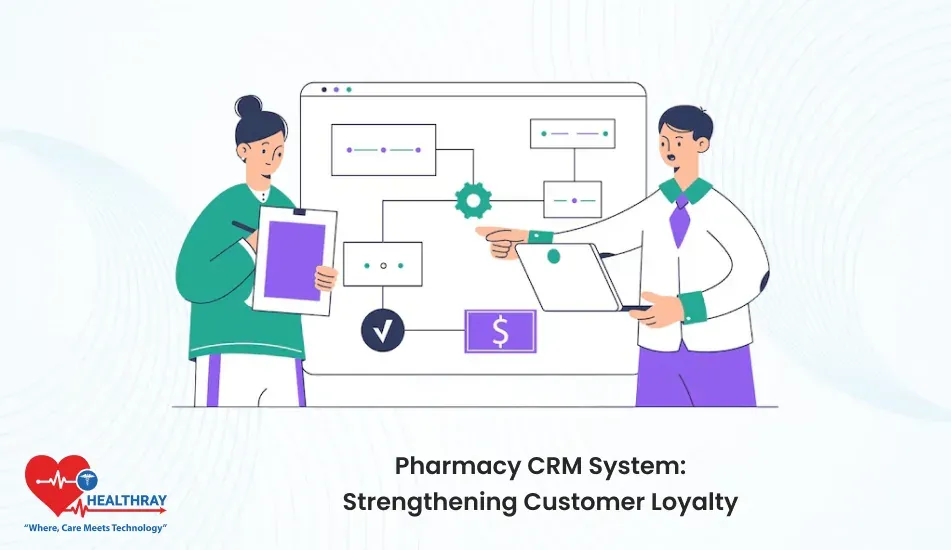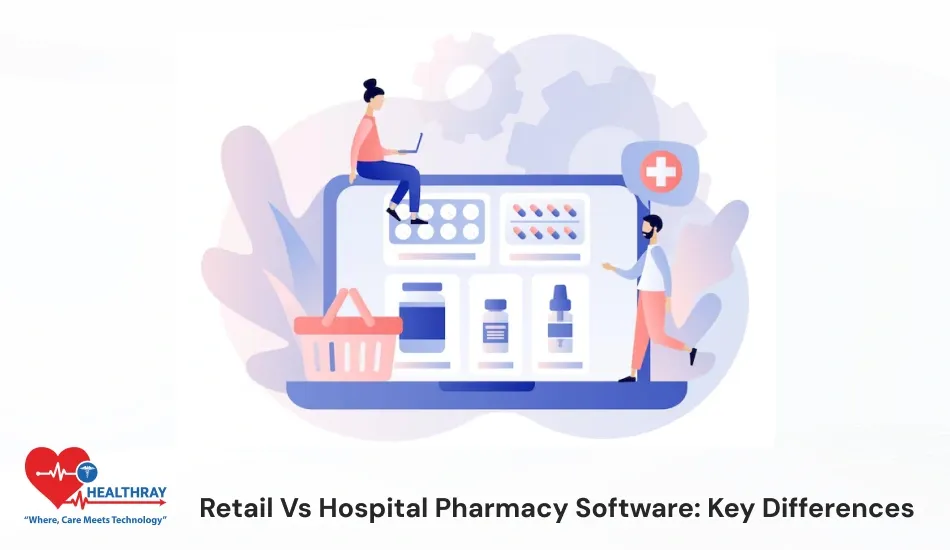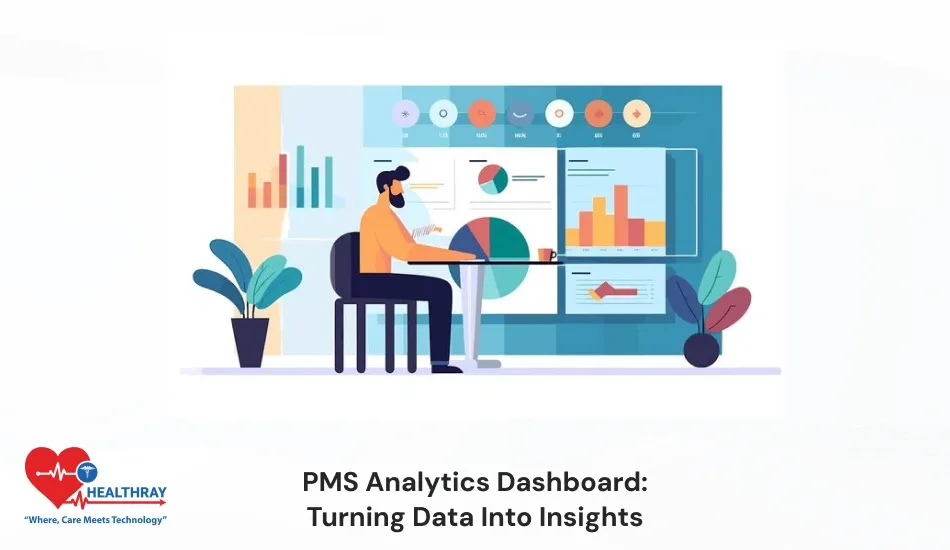Hospital Management Information Systems (HMIS) play a pivotal role in modern healthcare. They manage patient records, streamline administrative tasks, and improve overall hospital efficiency. With the integration of Artificial Intelligence (AI), these systems are evolving into smarter, more effective tools that benefit both healthcare providers and patients.
AI is not just a buzzword—it’s revolutionizing healthcare by enhancing decision-making, reducing operational inefficiencies, and paving the way for predictive healthcare solutions. Imagine a system that not only tracks patient data but also predicts resource needs during peak hours or flags high-risk patients before symptoms worsen.
This post explores the profound benefits of integrating AI into the Hospital Information Management System. It will help healthcare administrators and IT professionals understand how these innovations can reshape hospital operations and improve patient care.
Benefits of AI Integration in Hospital Management Information Systems
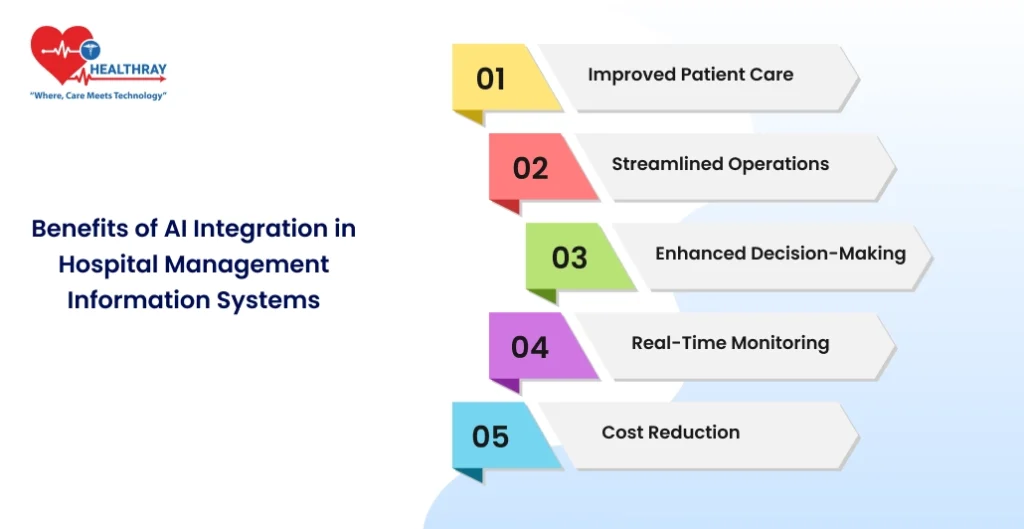
AI integration in HMIS is revolutionizing how hospitals manage their operations and deliver care. By bringing intelligence and automation into everyday tasks, it creates measurable value in several areas:
Improved Patient Care
AI enhances patient care by identifying patterns in medical records, enabling early detection of diseases, and providing decision support for clinicians. For example, AI algorithms can analyze a patient’s symptoms and medical history to suggest potential diagnoses or treatment options. This reduces diagnostic errors and improves treatment outcomes.
Streamlined Operations
Administrative tasks like patient admissions, billing, and scheduling are often time-consuming and prone to errors. AI-powered HMIS automates these processes, allowing staff to focus more on patient care. Automated scheduling systems can predict peak periods and allocate resources Enhanced Decision-Making
AI introduces predictive analytics into HMIS, helping hospitals make data-driven decisions. For instance, AI can forecast patient admission rates during flu seasons or other outbreaks, ensuring adequate staffing and supplies. It also aids in optimizing bed management and discharge planning.
Real-Time Monitoring
AI systems can continuously monitor vital signs and alert healthcare providers to potential risks, such as a sudden drop in blood pressure or irregular heart rhythms. This proactive approach allows for timely intervention, potentially saving lives.
Cost Reduction
Operational inefficiencies often lead to increased costs in hospitals. AI reduces waste by optimizing resource usage and preventing unnecessary procedures. This directly impacts the hospital’s financial performance while improving the quality of care.
Challenges and Risks of AI Integration in HMIS
While the benefits of integrating AI into HMIS Software are significant, it’s important to address the challenges and risks that come with it. Understanding these barriers is crucial for effective implementation and long-term success.
Data Privacy and Security
AI systems rely on vast amounts of patient data to function effectively. This raises concerns about data breaches and unauthorized access. Protecting sensitive information and ensuring compliance with regulations like HIPAA is a constant challenge. Hospitals must invest in robust cybersecurity measures to safeguard patient data.
Implementation Costs
AI integration requires substantial initial investments in technology, infrastructure, and training. For smaller hospitals with limited budgets, these costs can be prohibitive. Decision-makers need to evaluate the return on investment and explore funding options to make AI adoption feasible.
Resistance to Change
Healthcare professionals may resist adopting AI-powered systems due to fear of job displacement or a lack of understanding about how these technologies work. Providing adequate training and emphasizing AI’s role as a supportive tool rather than a replacement can help overcome this resistance.
Interoperability Challenges
AI systems must seamlessly integrate with existing HMIS platforms and other healthcare technologies. Poor compatibility can lead to inefficiencies, data silos, and increased frustration among users. Ensuring interoperability is critical for smooth implementation.
Ethical Concerns
AI systems can inadvertently introduce bias, especially if the algorithms are trained on unrepresentative data. This may lead to disparities in treatment recommendations or resource allocation. Hospitals must prioritize ethical AI practices and conduct regular audits to identify and mitigate bias.
Dependence on High-Quality Data
The accuracy and reliability of AI systems depend on the quality of the data they process. Incomplete or inaccurate records can lead to erroneous outputs, compromising patient safety. Hospitals need to ensure consistent data entry and validation processes.
Implementation Strategies for AI Integration in HMIS
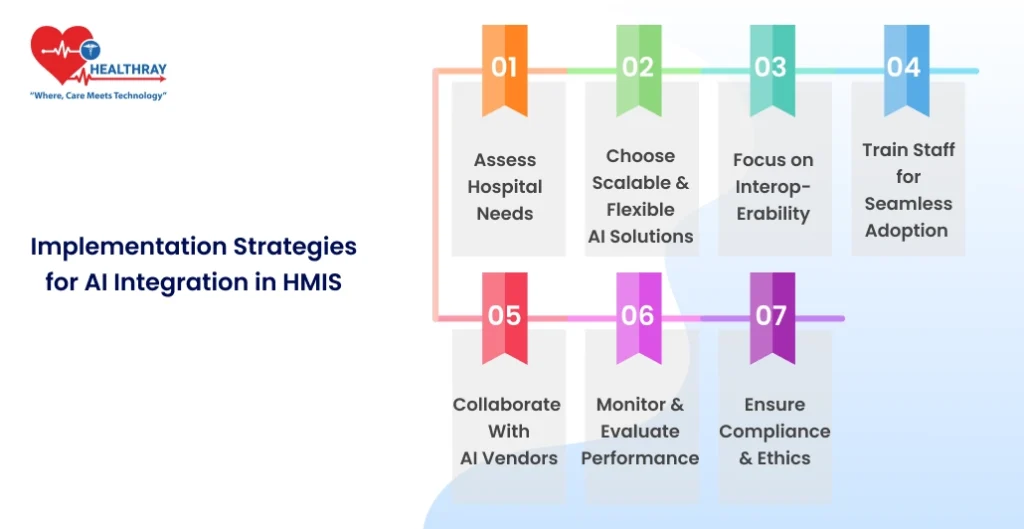
Successfully integrating AI into Hospital Management Information Software (HMIS) requires a thoughtful approach. Hospitals must balance the technical, operational, and cultural aspects of this transformation. Here are some key strategies to ensure smooth implementation:
Assess Hospital Needs
Before introducing AI solutions, it’s essential to identify specific pain points within the hospital. Whether it’s improving patient flow, reducing administrative errors, or enhancing clinical decision-making, understanding these needs helps in selecting the most appropriate AI tools.
Choose Scalable and Flexible AI Solutions
Hospitals operate in dynamic environments where needs can change rapidly. Selecting AI solutions that are scalable and adaptable ensures they remain effective as the hospital grows or faces new challenges. It’s also crucial to prioritize systems that can integrate seamlessly with existing technologies.
Focus on Interoperability
Interoperability is key to preventing data silos and ensuring smooth communication between different systems. Hospitals should adopt AI solutions that adhere to international standards, making it easier to exchange data across departments and with external healthcare providers.
Train Staff for Seamless Adoption
Introducing new technologies often meets resistance if staff feel unprepared or threatened. Comprehensive training programs can help healthcare administrators and IT professionals understand how to use AI tools effectively. Emphasizing the supportive role of AI can also ease fears of job displacement.
Collaborate with AI Vendors
AI vendors play a critical role in the successful implementation of their technologies. Regular collaboration ensures that the solutions are customized to meet the hospital’s unique requirements. Vendors can also provide ongoing support, including troubleshooting and updates.
Monitor and Evaluate Performance
Post-implementation, it’s vital to continuously monitor the performance of AI systems. Setting key performance indicators (KPIs) helps in assessing whether the tools are delivering the intended benefits. Regular evaluations allow for adjustments and improvements as needed.
Ensure Compliance and Ethics
Hospitals must ensure that AI implementation complies with local and international healthcare regulations. Additionally, ethical considerations, such as bias mitigation and patient consent, should be integrated into every step of the process.
Ethical Considerations in AI Integration for HMIS
Integrating AI into Hospital Management Information Systems (HMIS) brings ethical challenges that require careful attention. Hospitals must address these concerns to maintain trust, ensure fairness, and uphold patient rights. Here are the key ethical considerations:
Bias in AI Algorithms
AI algorithms can reflect and even amplify biases present in the data they are trained on. For instance, if training data lacks diversity, the system may produce biased outcomes, such as unequal treatment recommendations. Hospitals must work with AI developers to audit and refine algorithms, ensuring they are fair and representative.
Patient Confidentiality
AI systems handle sensitive patient information, making data privacy a critical ethical issue. Hospitals must comply with privacy regulations like HIPAA and ensure that AI tools use patient data responsibly. Encryption, access controls, and anonymization can safeguard data integrity.
Informed Consent
Patients should be informed about how their data is used in AI systems. Transparency in data collection and processing builds trust. Hospital Information Management should implement policies that allow patients to opt-in or out of having their data used for AI applications.
Accountability and Liability
Determining accountability in AI-driven decisions can be complex. If an AI system makes an error that harms a patient, questions about liability arise. Hospitals should establish clear guidelines for accountability and ensure that human oversight is part of the decision-making process.
Balancing Automation with Human Judgment
While AI can improve efficiency and accuracy, it should not replace human expertise. Healthcare professionals must retain the ability to override AI recommendations when necessary. This balance ensures that patients receive personalized and context-sensitive care.
Regulatory Compliance
AI in healthcare operates within a regulated environment. Hospitals must stay updated on legal requirements and industry standards for AI integration. This ensures not only ethical compliance but also protection against potential legal challenges.
Transparency in AI Decisions
AI systems can sometimes function as “black boxes,” where their decision-making processes are not easily understood. Hospitals should prioritize the use of explainable AI (XAI) tools that provide clear reasoning for their outputs. This enhances trust among both patients and healthcare professionals.
Case Studies: Successful AI Integration in HMIS
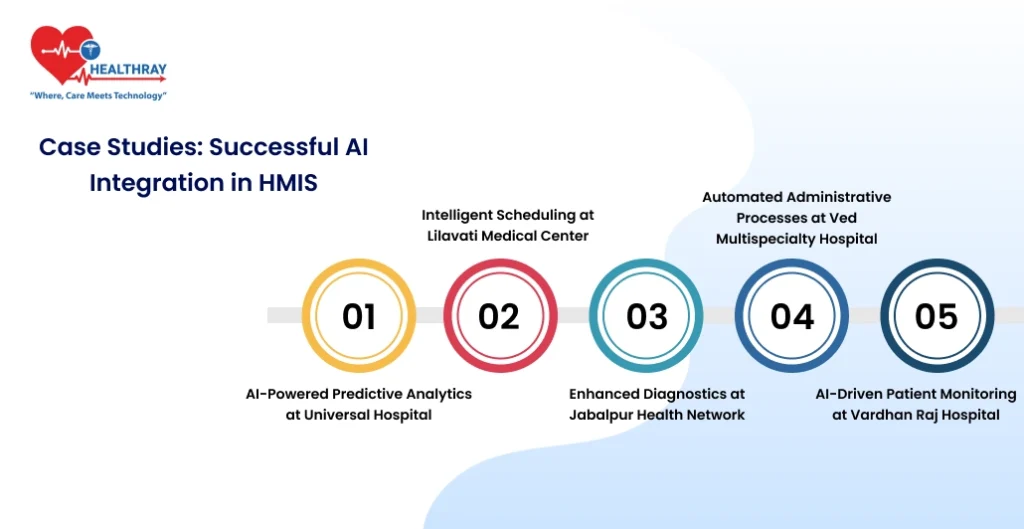
Real-world examples demonstrate how AI integration in Hospital Management Information Systems can transform healthcare. These case studies highlight the tangible benefits and lessons learned from successful implementations.
AI-Powered Predictive Analytics at Universal Hospital
Universal Hospital implemented an AI-based predictive analytics system to manage patient flow during peak times. The system analyzed historical data to forecast admission rates and resource needs. As a result, the hospital reduced patient wait times by 30% and improved bed availability during critical periods.
Key Takeaway: Predictive analytics can optimize resource allocation, enhancing operational efficiency and patient satisfaction.
Intelligent Scheduling at Lilavati Medical Center
Lilavati Medical Center faced challenges in managing staff schedules and appointment bookings. By integrating an AI-driven scheduling system, the center reduced appointment overlaps and minimized staff burnout. The tool also provided data-driven insights to plan for high-demand services.
Key Takeaway: AI in scheduling systems improves both employee productivity and patient access to care.
Enhanced Diagnostics at Jabalpur Health Network
Jabalpur Health Network adopted an AI-powered diagnostic tool for radiology. The system analyzed imaging data to identify early signs of diseases, such as tumors and fractures, with high accuracy. It served as a second opinion for radiologists, reducing diagnostic errors by 25%.
Key Takeaway: AI tools in diagnostics enhance clinical decision-making and improve patient outcomes.
Automated Administrative Processes at Ved Multispecialty Hospital
Ved Multispecialty Hospital implemented AI for automating billing and claims processing. The system identified discrepancies in real-time, reducing claim denials by 20% and ensuring faster reimbursements. Staff could focus more on patient interactions instead of administrative tasks.
Key Takeaway: Automating routine tasks with AI can significantly boost administrative efficiency.
AI-Driven Patient Monitoring at Vardhan Raj Hospital
Vardhan Raj Hospital introduced AI-powered wearables to monitor patients with chronic conditions. These devices continuously tracked vital signs and alerted clinicians to potential issues, enabling timely interventions. This approach reduced hospital readmission rates by 18%.
Key Takeaway: Continuous monitoring through AI-driven tools enhances preventive care and improves long-term health outcomes.
Conclusion
AI integration into Hospital Management Information Systems is no longer a luxury—it’s becoming a necessity for modern healthcare. From improving patient outcomes to streamlining operations, AI has proven its potential to transform hospitals into more efficient and patient-centered institutions.
While challenges like data privacy, implementation costs, and ethical concerns exist, they can be addressed with careful planning and collaboration. By focusing on interoperability, training, and ethical use, healthcare administrators and IT professionals can unlock the full potential of AI.As hospitals continue to embrace AI, the future looks promising. With advancements in technology and increased acceptance, AI-driven Hospital Information Systems will likely become the backbone of smarter, more responsive healthcare systems.
